
You can avoid hearing loss by being proactive and understanding the early warning signs.
Hearing loss can start at any age. According to the National Academy on Aging and Society, the number of affected Americans between the ages of 45 and 64 has increased significantly since 1971. But it’s much more common in seniors: Some 40 percent of the 20 million Americans who have hearing loss are 65 or older.
Contrary to popular belief, however, hearing loss is not an inevitable part of aging. Some causes can be prevented, and most types can be helped.
Types and Causes of Hearing Loss
- Sensorineural hearing loss is caused by damage to the inner ear nerves or the nerves that carry sound to the hearing area of the brain. Once you have this type of nerve damage, the only treatment is a hearing aid. Causes of sensorineural hearing loss include injuries, tumors, infection, certain medications, and excessive noise exposure.
- Conductive hearing loss is caused by a condition that blocks sound waves from being transferred to the nerves involved in the hearing process. Whereas sensorineural hearing loss usually affects both ears, conductive hearing loss may only affect one ear. Common causes include ear infections, ear wax, ear trauma such as a punctured eardrum, and other diseases that affect the ear canal, the eardrum, or the tiny bones in the middle ear. This can often be corrected and restored.
- Mixed hearing loss occurs when someone who has nerve type hearing loss from aging or noise trauma also gets an ear infection or develops a wax impaction, causing hearing to suddenly get much worse. It’s a combination of both other reasons for sub-par hearing.
Tips for Hearing Loss Prevention
Reducing your exposure to loud noises is a key component of avoiding deafness. Noise is measured in units called decibels: Normal conversation is about 45 decibels, heavy traffic may be about 85 decibels, and a firecracker may be about 120 decibels. Loud noise — anything at or above 85 decibels — can cause damage to the cells in the inner ear that convert sound into signals to the brain. Here are some tips for avoiding noise-induced hearing difficulties:
- Minimize your exposure to loud noises that are persistent.
- Never listen to music through headphones or ear buds with the volume all the way up.
- Wear ear plugs or protective earmuffs during any activity that exposes you to noise at or above 85 decibels.
- See your doctor about a baseline hearing test, called an audiogram, to determine whether your hearing is suffering.
You should also see your doctor if you have any symptoms of ear pain, fullness, or ringing, or if you experience any sudden change in your hearing. These symptoms could be early warnings.
Hearing loss or deafness can have a serious effect on social well-being. It can cut you off from the world around you. Know its causes, and practice prevention to preserve the hearing you still have.
Get In Touch With Clarity Audiology & Hearing Today
Clarity Audiology & Hearing Solutions is an independently-owned and operated clinic that focuses on quality of care and personalized, friendly service. Our Doctors of Audiology are highly trained with advanced degrees and take the time to provide the personalized care and attention that you need and deserve. We provide advanced hearing aid options that personally calibrated with cutting-edge digital technology to fit your hearing loss, your unique ear anatomy, and your individual listening needs. Come in for a walk-in appointment on Tuesdays & Fridays from 10:00am to 11:30am, or contact us to schedule an appointment by calling 410-698-6594 or visiting our contact page. Follow us on Facebook, Twitter, Pinterest, Google+, and LinkedIn for more blog posts, news, and updates!
